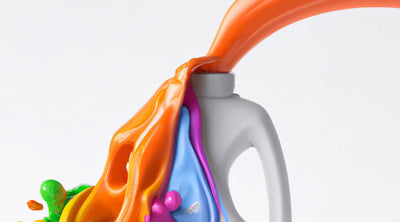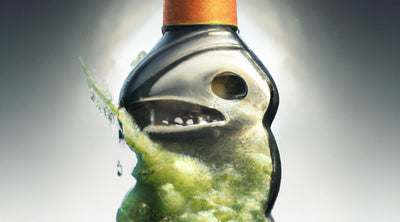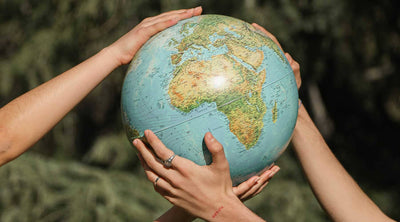Sustainability 101
Is Recycling A Scam?
25 November, 2021
For decades, recycling has been touted as the answer to the global waste problem. But, as populations along with human consumption rise, we must rethink our approach to recycling. Since COVID-19, more people are purchasing single-use plastic packaging than ever before to prevent the transmission of disease. Yet, business for recycling facilities worldwide has shrunk. There’s been a 20% drop in Europe, 50% dip in parts of Asia, and a nearly 60% hit in the United States as a result of the pandemic.
Questions such as ‘is recycling a scam?’ are now being asked about recycling as a result. Read on to find out all you need to know on the topic.

We all know that recycling is important and most of us do it at home. But is recycling really working? It's not as simple as throwing something in the recycling bin. The truth is, we need to consider all factors involved when we ask if recycling is solving our waste problems. To start, we need to change how we look at the problem. Instead of assuming that recycling will be the answer, we need to think about reducing our consumption.
For over 35 years, The Environmental Protection Agency (EPA) has been collecting and interpreting data on the disposition of waste in the United States. As of 2018:
An investigation revealed that the largest oil companies, which manufacture plastic, knew that their product wasn’t entirely recyclable, but sold it to the public anyway. An internal industry document was found, along with interviews with former top officials of the largest oil companies. According to the document, officials knew plastic was too costly to recycle since it rapidly degrades through the recycling process, rendering it unusable. Yet, they knew the public would keep buying it anyway.
Millions of dollars were spent on ads like "Plastics Makes It Possible" back in 1997, promoting the message that plastic is special and that the consumer should recycle it. But in actual fact, plastics are eventually buried in landfills or end up in the ocean for the most part.

There are a few obstacles that can make your recycling efforts feel like a scam. Find out how this could be below.
Countries Buy & Sell Recyclables
You might think that your recycling ends up at the local recycling plant but this isn’t entirely the case. While some of it most definitely does, the majority of recyclables are sold to countries with the right equipment to recycle items effectively. The recycled goods industry is very lucrative. Recycled paper is expected to climb to USD $5.42 billion in 2024 whilst plastics will rise to USD $33.8 billion by 2023.
Like with any market, demand is very important. If demand for plastic reduces, less plastic will be recycled and ultimately more of it will end up in landfills. Furthermore, wealthy countries often export their recycled goods to developing countries. While this reduces the cost of disposal, it can also overwhelm local infrastructure. Developing countries may lack the resources to process the materials, so they are inevitably sent to landfills anyway.
In 2018, China enacted the ‘National Sword’ policy. This prohibited the import of 24 types of waste such as plastics and other recyclables from other countries. For over 25 years, China managed half of the world’s recycled waste. This left countries like the United States scrambling to find alternative means to recycle a lot of its waste. While powerhouses like the U.S. can quickly adapt to such sudden changes they do still face some challenges to this day.
With such cases, it's easy to see how the waters of recycling can become muddied when huge financial incentives and political agendas are also in the mix.
Recycling Is Expensive & Can Also Harm The Environment
In the United States, recycling is more expensive than sending materials to the landfill. This is a complex problem that comes down to three main issues: the global market for scrap materials, the price of oil, and our reliance on cheap single-use products.
When China imposed the restrictions on recycled goods, it caused serious upheaval in the market. This caused a lack of supply and a subsequent increase in prices. In order for US cities to recoup their costs for collecting and shipping recyclables, they've chosen to sell them at a lower price, even if it means taking a loss.
As of today, there is no national recycling program. Instead, individual cities and communities create their own recycling initiatives. These initiatives must compete against schools, road repairs, police departments, and other essential services for funding. This makes it very difficult for a city or community to start a comprehensive recycling scheme. The costs between buying machinery, getting resources to recycle, and transportation, really start adding up. And then when you also factor in that sending recyclables to landfills is often cheaper, the costs can quickly start to outweigh the benefits for some.
That being said, recycling is better for the environment because it generates fewer greenhouse gases while also using less energy to produce the same products. Yet still, it’s not completely harmless. Oftentimes mainstream media overemphasizes the message that recycling is the way to go. However, a better message should be to repair and reuse what we already have, which will reduce the need for recycling.
Materials Cannot Be Endlessly Recycled
Materials such as glass and metal have very long recycling lifespans. However, through enough recycling runs, quality will be affected and the materials will eventually become unusable. Plastics, on the other hand, can only be recycled once or twice because their chemical structure breaks down quite quickly. This is where the recycling scam whispers often stem from. Reusing what we already have is a great solution to ensure a cleaner environment. Upcycling is one such method of achieving that.
Not Everything Is Recyclable
Of all municipal waste, plastic proves the most difficult to recycle. Not all plastics are the same and some cannot be recycled. All plastics come with a number called a resin code representing whether or not it is recyclable. Plastics with numbers 1 and 2 (Polyethylene Terephthalate (PET) & High-Density Polyethylene (HDPE) make up around 80-90% of the marketplace for recycled plastic. These are items such as milk bottles, soda bottles, or laundry detergent bottles. But, plastics numbered 3 to 7 such as Polyvinyl Chloride (PVC), Low Density Polyethylene (LDPE) and Polystyrene (PS) are more difficult to recycle. These categories include items like PVC pipes, plastic bags, and plastic cutlery.
PVC products, for example, contain so many additives that it makes recycling too expensive and impractical.
Questions such as ‘is recycling a scam?’ are now being asked about recycling as a result. Read on to find out all you need to know on the topic.
Does Recycling Really Work?

We all know that recycling is important and most of us do it at home. But is recycling really working? It's not as simple as throwing something in the recycling bin. The truth is, we need to consider all factors involved when we ask if recycling is solving our waste problems. To start, we need to change how we look at the problem. Instead of assuming that recycling will be the answer, we need to think about reducing our consumption.
For over 35 years, The Environmental Protection Agency (EPA) has been collecting and interpreting data on the disposition of waste in the United States. As of 2018:
- Municipal solid waste was 292.4 million tons, which equated to 4.9 pounds per person per day.
- Almost 94 million tons of municipal solid waste was recycled and composted
- More than 146 million tons of municipal solid waste was landfilled
- The most recycled item was corrugated boxes, which came in at 32.1 million tons
- Only 3 million tons of plastic were recycled
An investigation revealed that the largest oil companies, which manufacture plastic, knew that their product wasn’t entirely recyclable, but sold it to the public anyway. An internal industry document was found, along with interviews with former top officials of the largest oil companies. According to the document, officials knew plastic was too costly to recycle since it rapidly degrades through the recycling process, rendering it unusable. Yet, they knew the public would keep buying it anyway.
Millions of dollars were spent on ads like "Plastics Makes It Possible" back in 1997, promoting the message that plastic is special and that the consumer should recycle it. But in actual fact, plastics are eventually buried in landfills or end up in the ocean for the most part.
Obstacles That Make Recycling A Scam

There are a few obstacles that can make your recycling efforts feel like a scam. Find out how this could be below.
Countries Buy & Sell Recyclables
You might think that your recycling ends up at the local recycling plant but this isn’t entirely the case. While some of it most definitely does, the majority of recyclables are sold to countries with the right equipment to recycle items effectively. The recycled goods industry is very lucrative. Recycled paper is expected to climb to USD $5.42 billion in 2024 whilst plastics will rise to USD $33.8 billion by 2023.
Like with any market, demand is very important. If demand for plastic reduces, less plastic will be recycled and ultimately more of it will end up in landfills. Furthermore, wealthy countries often export their recycled goods to developing countries. While this reduces the cost of disposal, it can also overwhelm local infrastructure. Developing countries may lack the resources to process the materials, so they are inevitably sent to landfills anyway.
In 2018, China enacted the ‘National Sword’ policy. This prohibited the import of 24 types of waste such as plastics and other recyclables from other countries. For over 25 years, China managed half of the world’s recycled waste. This left countries like the United States scrambling to find alternative means to recycle a lot of its waste. While powerhouses like the U.S. can quickly adapt to such sudden changes they do still face some challenges to this day.
With such cases, it's easy to see how the waters of recycling can become muddied when huge financial incentives and political agendas are also in the mix.
Recycling Is Expensive & Can Also Harm The Environment
In the United States, recycling is more expensive than sending materials to the landfill. This is a complex problem that comes down to three main issues: the global market for scrap materials, the price of oil, and our reliance on cheap single-use products.
When China imposed the restrictions on recycled goods, it caused serious upheaval in the market. This caused a lack of supply and a subsequent increase in prices. In order for US cities to recoup their costs for collecting and shipping recyclables, they've chosen to sell them at a lower price, even if it means taking a loss.
As of today, there is no national recycling program. Instead, individual cities and communities create their own recycling initiatives. These initiatives must compete against schools, road repairs, police departments, and other essential services for funding. This makes it very difficult for a city or community to start a comprehensive recycling scheme. The costs between buying machinery, getting resources to recycle, and transportation, really start adding up. And then when you also factor in that sending recyclables to landfills is often cheaper, the costs can quickly start to outweigh the benefits for some.
That being said, recycling is better for the environment because it generates fewer greenhouse gases while also using less energy to produce the same products. Yet still, it’s not completely harmless. Oftentimes mainstream media overemphasizes the message that recycling is the way to go. However, a better message should be to repair and reuse what we already have, which will reduce the need for recycling.
Materials Cannot Be Endlessly Recycled
Materials such as glass and metal have very long recycling lifespans. However, through enough recycling runs, quality will be affected and the materials will eventually become unusable. Plastics, on the other hand, can only be recycled once or twice because their chemical structure breaks down quite quickly. This is where the recycling scam whispers often stem from. Reusing what we already have is a great solution to ensure a cleaner environment. Upcycling is one such method of achieving that.
Not Everything Is Recyclable
Of all municipal waste, plastic proves the most difficult to recycle. Not all plastics are the same and some cannot be recycled. All plastics come with a number called a resin code representing whether or not it is recyclable. Plastics with numbers 1 and 2 (Polyethylene Terephthalate (PET) & High-Density Polyethylene (HDPE) make up around 80-90% of the marketplace for recycled plastic. These are items such as milk bottles, soda bottles, or laundry detergent bottles. But, plastics numbered 3 to 7 such as Polyvinyl Chloride (PVC), Low Density Polyethylene (LDPE) and Polystyrene (PS) are more difficult to recycle. These categories include items like PVC pipes, plastic bags, and plastic cutlery.
PVC products, for example, contain so many additives that it makes recycling too expensive and impractical.
Recycling Alone Is Not The Solution
Recycling plays a huge role in managing the world’s waste problem, yet it is only one part of the puzzle. Contrary to how the messaging from mainstream media can be construed, recycling is not the key to this growing issue. It’s the reason why many are starting to believe in a big recycling hoax. A combination of changing our consumption habits and reusing more of what we already have in addition to recycling, will have the greatest positive impact on the planet's wellbeing.MORE Sustainability 101 ARTICLES View all ›
Ready to make
the switch?
- Powerful Cleaning
- Dissolves Easily
- Skin-Friendly
- Eco-Friendly
- No Mess













